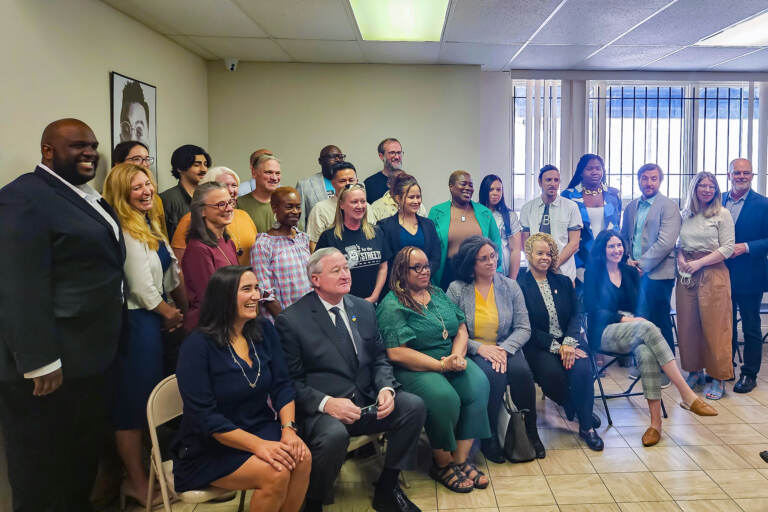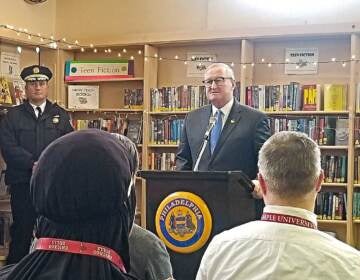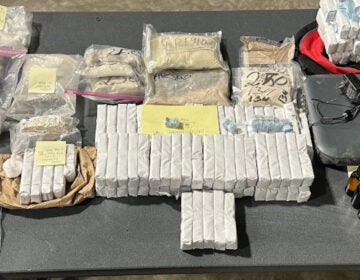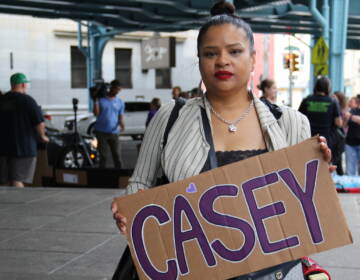Philadelphia names 27 community organizations to receive opioid settlement funds for addiction treatment and prevention efforts
Philly takes first steps in distributing national opioid settlement funds with $1.9 million in grants for community and grassroots organizations.
Listen 0:55
Philadelphia Mayor Jim Kenney and city officials at the Mike Hinson Resource Center announce the city’s first round of grant recipients under the Overdose Prevention and Community Healing Fund, Thurs., June 8, 2023. (Nicole Leonard/ WHYY)
Philadelphia officials have chosen 27 community and grassroots organizations to lead addiction prevention and treatment services in areas hit hardest by the opioid epidemic.
Each organization will get grant money through the city’s Overdose Prevention and Community Healing Fund to expand or launch new programs on harm reduction, treatment services, education efforts, youth, homelessness support, trauma care, housing, legal aid, and more.
The awards are part of Philadelphia’s larger spending plan for its share of settlement money won in national lawsuits against major opioid manufacturers and distributors, which were accused of fueling the opioid epidemic.
“I think this project really epitomizes the city’s desire to put the dollars into the hands of affected communities and the people that know best about what their community needs,” said Joe Pyle, president of the Scattergood Foundation, which has partnered with the city to distribute settlement dollars.
Philadelphia received $20 million in the first year of payouts, which will continue for another 17 years under the terms of national settlement agreements with drug manufacturer Johnson & Johnson, and pharmaceutical distributors AmerisourceBergen, Cardinal Health, and McKesson.
Jennifer Sommerville, director of development at Timoteo Sports, was a member of the city’s grant review group. She previously lived in Kensington and is now in West Philadelphia.
“These folks are suffering, and they are my immediate neighbors,” Sommerville said. “That’s something that I see, just my neighbors and people who need healing and who need help.”
Organizations each awarded $20,000 “capacity building grants” include:
- Angels in Motion
- By Faith Eternal Health Care DBA By Faith Healing and Healing
- CADEKids
- First Stop Recovery
- Original Kensington Outreach Foundation
- Philadelphia Prevention Partnership
- Philly Unknown
- Puentes de Salud
- RAWTools Philly
- Socks for the Streets
Organizations and projects each awarded $100,000 “program grants” include:
- AMANDLA, Inc. (Safe-Hub Philadelphia) for “Safe-Hub Collective Impact Expansion”
- Anti-Drug and Alcohol Crusaders for “Philly Youth Making Positive Choices”
- Ark of Safety for “Ark of Safety Drop-In Center”
- Broad Street Ministry for “2023 Behavioral Health Initiative”
- Courage Medicine Health Center Inc for “Courage to Heal”
- Danny’s House for “Recovery Housing”
- Eluna, formerly named The Moyer Foundation, for “Support Program for Families Grieving an Overdose Death”
- Fab Youth Philly for “Youth Workforce Development Programming”
- Homeless Advocacy Project for “HAP Legal Clinic at the Mike Hinson Resource Center”
- Mercy Neighborhood Ministries for “A Path to Prosperity”
- Operation in My Backyard for “Harm Reduction Outreach”
- Philadelphia Community Empowerment Through Soccer (Kensington Soccer Club) for “Active Community Spaces and Bright Futures”
- Providence Center for “Overdose Prevention Case Manager”
- Savage Sisters Recovery, Inc. for “People United for Social Healing (PUSH)”
- Stop the Risk (Impact Services) for “Harm Reduction and Intensive Case Management”
- Unity Recovery for “Expansion of Community-Based Harm Reduction and Employment Supports for the Philadelphia Community”
- Yoga 4 Philly for “Healing Kensington Initiative”
A total of 75 applications were submitted to the city for the grants.
City officials said they looked at projects and organizations that could address gap areas and the disproportionate rates of overdoses and deaths in certain groups, including among older Black and brown residents.
Tanya Rambert, executive director of the Homeless Advocacy Project in North Philadelphia, said a majority of the organization’s clients are Black.
“In many cases, clients have more than one critical issue to be addressed,” Rambert said. “With a serious mental illness accompanied by substance use disorders, connecting clients to treatment and support services is frequently a key component of HAP’s legal representation.”
Mayor Jim Kenney joined organization leaders and city officials Thursday for the grant announcements.
“It’s wonderful to see these funds going to people on the ground who are actually out there with folks and trying to keep people safe and alive,” he said. “I think that’s the most important point. I always tell people who complain about things that we may want to put in a neighborhood here or there so that we can help people recover if they’re alive – once they’re gone, we cannot have them rehabilitated. We can’t have them back.”
About 1,276 people in Philadelphia died from a drug overdose in 2021, the highest number ever reported for the area, according to the most recent year of city data.
WHYY is your source for fact-based, in-depth journalism and information. As a nonprofit organization, we rely on financial support from readers like you. Please give today.





